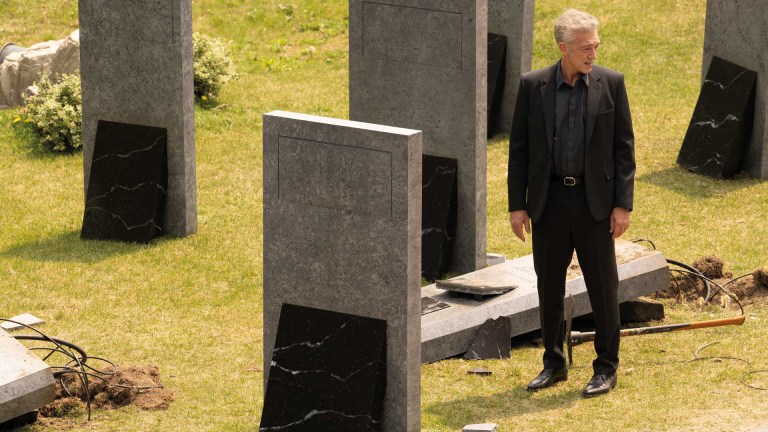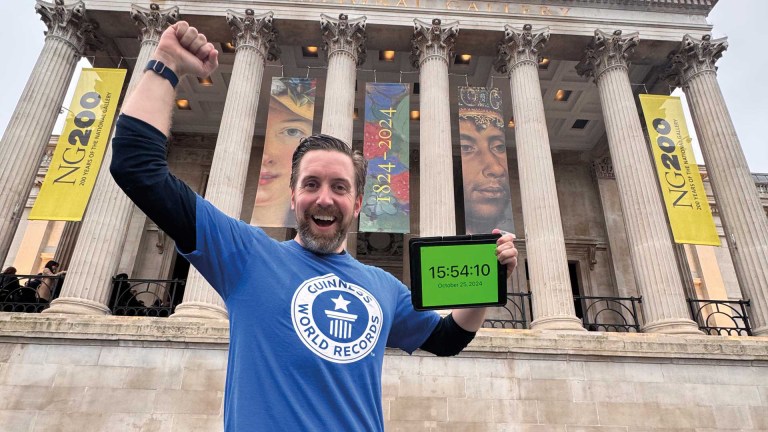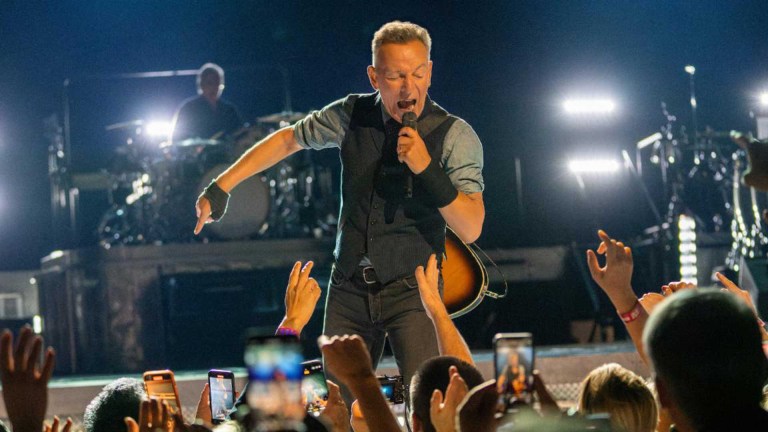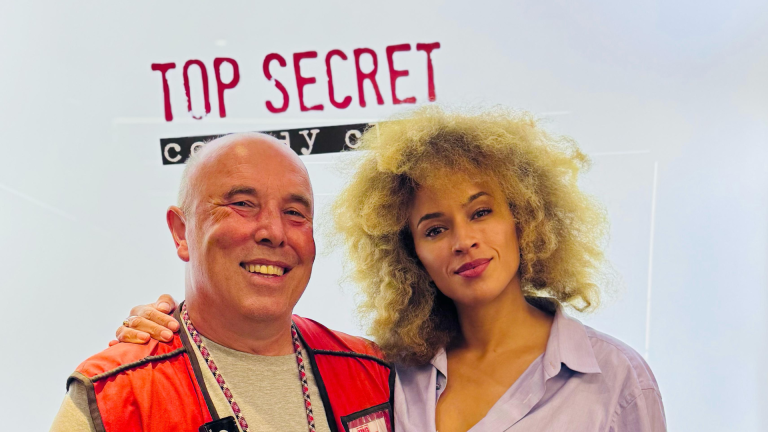“Hope is everything… I’ve always thought that. And I believe it. If you’ve got hope you can work towards something. It’s a medicine and a shield. I’m an optimist, I always see the good in people.”
Although this does not sound like Ricky Gervais, the 56-year-old actor, writer, director, controversial comedian and awards show roaster is an unlikely source of encouragement in these troubled times.
Running through his cringe-inducing humour there has always been a streak of sentimentality. While painful-to-watch impressions, motivational speeches and even more excruciating dance moves were the teeth and claws of The Office, the blushing romance between Dawn and Tim were its heart. It’s also the relationships between characters in Extras and Derek that linger in memory longer than individual episodes.
https://www.youtube.com/watch?v=sR6UeVptzRg
This year Gervais is still riding a wave of notoriety after his Golden Globes monologue verbally annihilated Hollywood elites, the video of which has been watched 300 million times since January and has proved more memorable than any of the movies feted that night. But Gervais’ ruthlessness is balanced by the return of his darkest yet most hopeful series – After Life, which he writes, directs and stars in. The first series was one of the most watched TV shows in the world last year, striking a chord with a global audience.
At the outset of After Life, Tony, destroyed by having lost the love of his life to cancer, contemplates suicide but decides that since he has nothing to live for he can use that as a pseudo-superpower, using his new-found nihilism as a licence to do and say whatever he wishes. The second series, out now on Netflix, focuses on Tony deciding to use his abilities for good, helping those who have helped him.
The second series brings us back to the impossibly idyllic middle-England village of Tanbury, where Tony bounces between a network of unlikely acquaintances played by a handpicked crop of British comedy stars, among them a feral postman (Joe Wilkinson), happy hooker (Roisin Conaty), demonic psychiatrist (Paul Kaye), churchyard widow (Penelope Wilton), dementia-stricken father (David Bradley) and his unrequited romantic interest (Ashley Jensen).
“He’s just starting to learn how important friends are,” Gervais explains. “In series one he was going through the seven stages of grief – shock, anger, denial, and now he’s in the negotiating phase – OK, what can I do to make me happy?”
Gervais gets slushy, there’s matchmaking, a Busby Berkeley-style ‘hey gang, let’s put on a show!’ subplot and a loveable scene-stealing dog is never far away. Before it becomes unbearably corny though, an old lady will use terribly offensive language, there will be a catalogue of inappropriateness and jokes so close to the bone that the flesh is never going to heal over. Navigating the darkness and light that constantly surrounds us feels like Gervais’ quest in After Life.
“We’ve all gone through grief. And the older you get, the more grief you go through,” Gervais says. “I lost both parents about 20 years ago, I lost my older brother last year. It’s usually the natural order of things, you lose your grandparents then your parents then your older siblings, and all that. But Tony feels cheated because he lost his life partner too early, and that adds to the grief and that gives him anger.
“The whole idea [for the series] started with – what if you lost everything? Well, what is losing everything? For me, it would be my partner [Gervais has been in a 35+ year relationship with author Jane Fallon]. I don’t think it gets worse than then losing your soulmate. So that’s where it came from.”
The response from audiences who can relate has been overwhelming. “I’ve never had a reaction like it,” Gervais says. “It’s incredible. People coming up and saying I lost my brother or my husband. It taught me that everyone’s grieving in some way or another, relatively recently or very recently, everyone is grieving something.”
The second series arriving in the midst of mass uncertainty, and sadness is timely. Gervais himself seems to be coping fine with lockdown.
“I’ve said many times you won’t hear me complain,” he confirms. “I don’t go out socially. Usually we sit and watch telly, we’re doing that. I’d do the hour’s exercise anyway. And there’s always enough booze in the house for a nuclear winter.
“When I see nurses doing 14-hour shifts and risking the health of themselves and their family, there are people in a lot worse situations than me. So yeah, you won’t hear me complaining.”
The two series of After Life explore alternative ways of how to process and move on from tragedy: 1) screw the world, 2) live for others. With society experiencing a collective trauma, does Gervais believe we can emerge from our cocoon-like isolation locations like butterflies, or will we return to our normal old, unfeeling selves?
When everything’s back to normal – and we will survive this and look back at it like we have other disasters and pandemics – I hope that we can have a slightly more caring society
“People want things to be back to normal,” he says. “Even if they didn’t like what normal was, we are creatures of habit and, you know, better the devil you know. We want our life back – for better or worse.
“But I think people are starting to realise what’s important. I never want to hear people complain about the NHS again. I want them to remember that they were clapping the NHS every week.
“I wouldn’t be here if it wasn’t for the National Health Service and free education. I was the fourth child of an immigrant labourer. We had no money. My mum was a homemaker and she could do anything, except give me money. I quickly learned the best things in life were free – nature, friends, education, and health. They trump everything. And it’s times like this where you do reflect and you do remember.
“When everything’s back to normal – and we will survive this and look back at it like we have other disasters and pandemics – I hope that we can have a slightly more caring society.
“But the truth is, we don’t know. There could be massive repercussions or it could all become a strange distant memory.”
Ever the unlikely irrepressible optimist however, Gervais continues: “It’s still better than life was 50 years ago in many ways. We’re still in total communication. I hadn’t heard of Zoom a month ago, and now I’m speaking to friends and family. You can have your food delivered online, these massive leaps in technology make it better.
“On a graph over time, with all the little peaks and troughs, society goes up and up and up. It’s better today than 50 years ago and 50 years ago was better than 100 years ago and 100 years ago was better than 1,000 years ago. For everything – attitudes, life expectancy, all these things.
“We’ve got to realise that it is a pretty good time to exist. Good people working in science will save us and show us the way and we’ll get through this like we always have.”
The second series of After Life is available on Netflix
At this time you can continue to support The Big Issue! Subscribe to the magazine now to receive it directly to your door or device – head to bigissue.com/subscribe for details – or pick up one off issues in The Big Issue app, available now from the App Store or on Google Play.
You can also pick up a copy in the shops for the first time – head to Sainsbury’s, McColl’s, Co-op, Asda or WH Smith, Morrisons or Waitrose to get your magazine.
As ever, 50 per cent of the proceeds will go to Big Issue vendors as we work hard to support them through the Covid-19 crisis while they are temporarily unable to sell the magazine on the streets.










